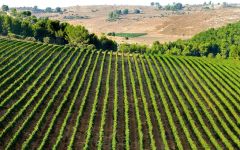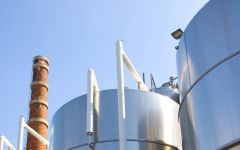Carmel Selected Chardonnay (OU Kosher) 2017



Product Details
Your Rating
Somm Note
Winemaker Notes
The Carmel Selected Chardonnay exhibits strong citrus aromas, crisp taste, and mouthwatering butter and bread flavors while still having a great price point. The color is a golden yellow, with secondary notes of freshly baked croissant on the nose, and chalky minerality in the palate. The acidity is balanced with fruit flavors. There is a little bit of green notes on the finish with mouth watering acidity.
Pair this wine with stir fried vegetable dishes, chicken, and fish.
This wine is Kosher for Passover







Carmel Winery is the historic winery of Israel. It was founded in 1882 by Baron Edmond de Rothschild, owner of Château Lafite in Pauillac, Bordeaux. The story of Carmel represents the story of Israel, and the recent developments of Carmel's wine, symbolizes the revolution of Israeli wine in recent years.
Carmel Winery has 3,472 acres of vineyards, which cover the land of Israel from the Upper Galilee in the north, to the Negev in the south. Carmel's winemakers can therefore choose from vineyards with different terroirs from all the wine regions in Israel. Carmel has a particularly strong vineyard presence in the cooler climate of the Upper Galilee, from where many of the leading wines are sourced.
Carmel's Zichron Ya'acov Wine Cellars, built in 1892, is the largest winery in Israel. On the premises is a modern, state-of-the-art facility making small quantities of quality wines from Carmel's finest vineyards. The most advanced, modern winemaking technology blends in with the historic 120 year old cellars. The name of the winery is in memory of Edmond de Rothschild's father, Baron James Jacob (Ya'acov) de Rothschild, who purchased the famous Bordeaux winery, Château Lafite, for the Rothschild family. Zichron Ya'acov is a charming town which still has an atmosphere of pre-state Israel. It is situated south of Haifa on the southern slopes of Mount Carmel, overlooking the Mediterranean Sea.

One of the most popular and versatile white wine grapes, Chardonnay offers a wide range of flavors and styles depending on where it is grown and how it is made. While it tends to flourish in most environments, Chardonnay from its Burgundian homeland produces some of the most remarkable and longest lived examples. California produces both oaky, buttery styles and leaner, European-inspired wines. Somm Secret—The Burgundian subregion of Chablis, while typically using older oak barrels, produces a bright style similar to the unoaked style. Anyone who doesn't like oaky Chardonnay would likely enjoy Chablis.

With a rich history of wine production dating back to biblical times, Israel is a part of the cradle of wine civilization. Here, wine was commonly used for religious ceremonies as well as for general consumption. During Roman times, it was a popular export, but during Islamic rule around 1300, production was virtually extinguished. The modern era of Israeli winemaking began in the late 19th century with help from Bordeaux’s Rothschild family. Accordingly, most grapes grown in Israel today are made from native French varieties. Indigenous varieties are all but extinct, though oenologists have made recent attempts to rediscover ancient varieties such as Marawi for commercial wine production.
In Israel’s Mediterranean climate, humidity and drought can be problematic, concentrating much of the country’s grape growing in the north near Galilee, Samaria near the coast and at higher elevations in the east. The most successful red varieties are Cabernet Sauvignon, Merlot, and Syrah, while the best whites are made from Chardonnay and Sauvignon Blanc. Many, though by no means all, Israeli wines are certified Kosher.
